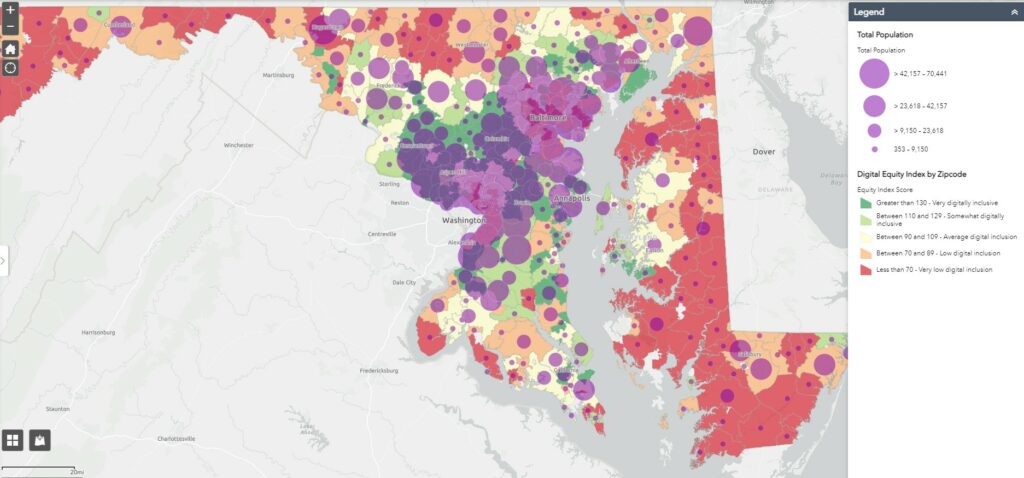New interactive map sheds light on the nature and nuances of digital inclusion across the state
FOR IMMEDIATE RELEASE
October 12, 2022
Contacts:
Cody Dorsey, Baltimore Digital Equity Coalition cody@digitalequitybaltimore.org
Sarah Manekin, Abell Foundation smanekin@abell.org
BALTIMORE – A coalition of digital equity advocates, including the Community Development Network of Maryland (CDN) and the Baltimore Digital Equity Coalition (BDEC), launches a new mapping tool that sheds light on the geography of disconnection in Maryland and underscores the need for urgent action. Relying on analysis provided by John B. Horrigan, Ph.D. of the Benton Institute on Broadband & Society and built by the Baltimore Neighborhood Indicators Alliance, the mapping tool was funded by the Abell Foundation and is available on CDN’s website here.
The map uses zip code level data and shows where high-speed internet subscription gaps are greatest – and by how much. Additional layers also reveal gaps in who owns computing devices and who relies on cellular data for internet connection. Analysis of the map indicates that network quality drives digital disconnection in rural areas, while the cost of internet subscriptions drives disconnection in more urban areas. It highlights that digital inequities exist statewide.
“Internet access and digital literacy are critical tools for daily living and keep people connected to jobs, to school, to healthcare, and to each other,” said Claudia Wilson Randall, executive director of the Community Development Network of Maryland. “With Maryland embarking on a planning process for improvements to our broadband infrastructure, and with the influx of funds from the federal government, we can use this map to better understand the existing disparities and devise solutions that will help close gaps and connect all of our communities across the state.”
The map builds on previous research by Horrigan, commissioned by CDN and funded by the Abell Foundation. The report, Disconnected in Maryland, found that two-thirds of disconnected Marylanders live in metro counties or Baltimore City. 40% of all Marylanders without wireline broadband are African American and the figures are similar for computer ownership of any kind (i.e., desktop, laptop, or tablet). Overall, nearly three-quarters of all disconnected Maryland households have incomes below the state’s median income.
“What this map represents is that closing the digital divide in Baltimore — and across Maryland — is possible. This resource will not only show us disconnected communities, but also the existing economic opportunity gaps. Digital equity – access to affordable internet, devices, and digital literacy — is a foundation for inclusion in the 21st Century,” said Cody L. Dorsey, executive director of the Baltimore Digital Equity Coalition. “As we reimagine what’s possible with once-in-a-lifetime funds through the Digital Equity Act, I know the map has the best data to assist policymakers in directing investments in their respective constituencies down to the zip code.”
CDN and BDEC are calling for a statewide planning process that address all dimensions of digital inclusion, including increased access for computing devices, especially for school children, low-income households, and Black and Hispanic households, better promotion of internet affordability programs, and training programs to support digital literacy, among other requests.
++++++++
About:
Baltimore Digital Equity Coalition (BDEC): BDEC connects committed organizations and individuals to coordinated efforts that advance digital equity and close the digital divide in Baltimore City.
Community Development Network of Maryland (CDN): Community development encompasses locally-generated initiatives to improve communities economically, physically and socially, for the benefit of the people who live and work there. The mission of CDN is to promote, strengthen, and advocate for the community development sector throughout Maryland’s urban, suburban, and rural communities.
Abell Foundation: The Abell Foundation is committed to improving health, economic, and educational outcomes in Baltimore City so that all people can thrive. As a private foundation focused exclusively on Baltimore City, Abell provides grants to nonprofit community partners, funds research to better inform civic conversation, and makes catalytic investments in new businesses that offer significant social and economic benefits to the city.
